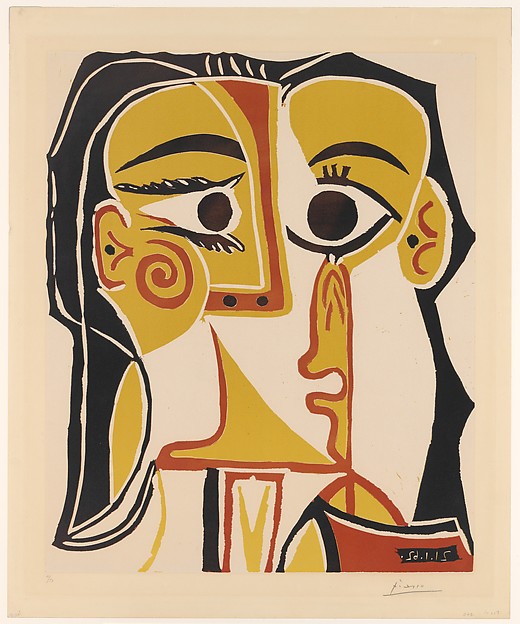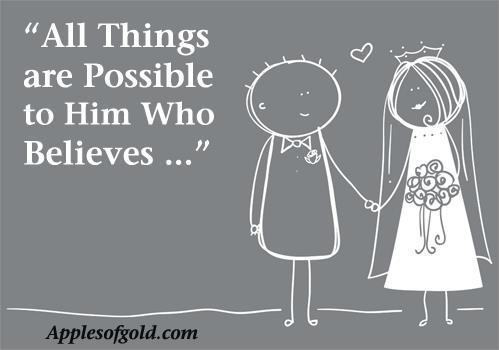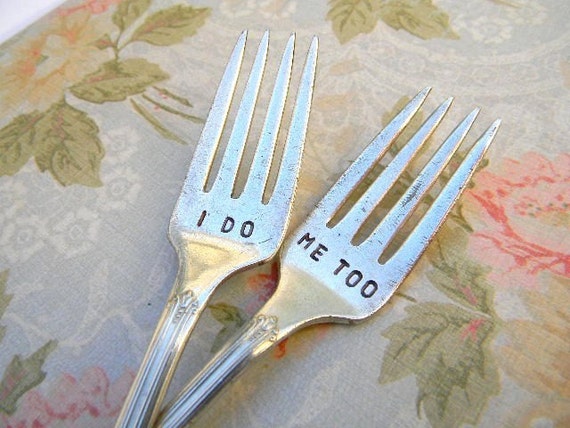There is more going on here at this wedding than simple words. This is more than a ceremony, more than a
party, more than a meeting of minds. We
hear familiar words here that could be spoken in any romantic comedy, and that
makes it seem less than what’s really going on here.
All around us are forces.
Our minds are forces, our spirits and our wills. We create with these forces, and we can
destroy. But creation is the greatest,
because some creations never end.
Suppose you wanted to create a table, and you put all your effort into
it, fashioning it out of wood, and the fibers weave together and it is a new,
firm entity—a table. Then someone else
came along and decided to destroy it.
With great effort, they took a sledgehammer and attacked the table. It took them a half hour to destroy what took
many hours, perhaps days, for you to create.
But a stranger could come by after the destruction and the tears were
over and say, “Hey, someone broke a table here.”
Even after the destruction, the idea and the fine strokes of
creation remain. They don’t disappear.
That is the work of one person. Each person, with our wills, our imaginations
and our spirits can create something powerful, something that cannot be
destroyed. We can write a book that
remains in the imagination of people long after every copy is burned. We can take a picture that keeps the image of
a building a century after the building has been torn down. We can do an act of kindness that remains
longer than the life we originally touched in the hearts of those who see
it. This is the power of a single,
frail, faulty human being.
But what if there are two?
What if two minds, two wills, two imaginations, two spirits join
together to do one task? What a great
task that should be! One can write a
book, but two can create a manifesto.
One can climb a ladder, but two can reach greater heights. One can rejoice, but it takes two to love. One can paint the Sistine Chapel, but it
takes two to create a world.
When two people join together, become unified on this
adventure that we call a marriage, they are not just creating a new life
together, they are creating a new world.
A world that never existed, that could never have been imagined,
suddenly pops into existence. It isn’t
just two people, two communities, two families that are forced together into a
single world. The marriage itself is the
first conception, the first offspring of the couple. And what we see right now as a seed, a bare
beginning, is not just a life together, as wonderful as that is, it is a new
culture, a new tradition, a new world.
The adventure of Jimmy and Kristyn will produce not just a life, but a
world that no one has ever seen before.

The best thing, I think, about love is we see a whole other
person, not just bits and pieces. And
that person is complex and intricate and contradictory and often confusing, but
wonderful. And we want to explore more
of that other person, and all the strangeness that it offers. I think that this is God’s trick: love. It is His way of tying us together to the
strangest, most alien thing in the world and we love every minute. And every moment with this opposing force
changes our very being, and our love of the Other, makes us a stronger person,
able to deal with every crisis because we love the strangest animal that ever
existed. And we are beginning to
understand that animal. It’s tough work,
but we enjoy every minute. That’s God’s
plan to make us better people through struggle and we love that struggle. Because we are fighting to create a new world
with the object of our love.
And as we understand the object of our desire more, with
their complexity, we change and so we change them. We aren’t ourselves anymore and neither are
they. We are both different because of
each other and we do things and say things and think things that no one has
ever done or said or thought. We are a
new creation, and together, we are born anew.
Pretty soon, no one gets us except our other, because no one went
through our experiences.
That is, until someone does.
Get us, I mean. Until we let
another into our new culture, our new world.
More than likely that’s a baby.
But it could be a friend who’s down on his luck. Or a stranger who needs a place to
crash. Or a relative who is having a
hard time. And the longer they spend in
our new world, the more they are influenced and warped by that world. If they stay long enough, this new world
encompasses them, and they are a part of it.
They may stay or they may leave,
but they will take that new culture with them. Parts of it.
And it all begins with the simple words: I do. To say “I do” is to simply say, “I promise”
or “I will.” To make a promise is an act
of creation. It is the beginning of a
new direction and in some cases it can be the beginning of a new world. And to have two people say “I do” to a new
world is a powerful thing.
But a wedding isn’t just two people saying “I do” to a new
world. We are all here to not just
recognize that these two are going on a great adventure together, creating a
new culture, but we are affirming that decision, we are saying “I do” with
their “I do” and setting them off on their journey.
Wait, didn’t you get to say “I do”? I heard Jimmy and Kristyn say it… didn’t
you? Well, let’s give you a chance. “Family and friends of Jimmy and Kristyn, and
even strangers if you just happen to walk in the door, do you affirm the
joining of Jimmy and Kristyn? Do you
approve of them making a new world? Do
you rejoice in their adventure in creating something that has never been seen
before?” If you approve, then say, “I
do”, on the count of three:
Now think about this.
If the force of two minds is powerful… if the force of two spirits and
two wills and two imaginations is powerful, what about fifty or sixty? Jimmy and Kristyn, all of these people
together affirm your life.
Only one more thing to make it amazing and mindblowing. The God of the universe, Jimmy, when you
said, I Do, so did He. And Kristyn, when
you said I do, so did God. And you guys
in the audience, when you said, I do, God said it with you. God’s hands are around your new life, your
new culture, your new world. His Spirit
is the incubator in which your new world will grow. The spirit of Jesus will make it grow in
love, in heart and in power. From this
moment, God is the Great Force that will make you guys grow together.
And what God has joined together, no human being can take
apart.







